#9: Somalia 1980, Part 1
We returned to the States as 1975 turned to ’76, discovering that some of our elders were not in good health. More long-term overseas projects didn’t make sense, we thought and decided to stay Stateside until the situations became clearer. Russell took a short-term consulting assignment advising Indonesian Government lawyers at U.C. Berkeley Law School, while I enrolled in a graduate course on Central Asian Nomads.
That fall, we moved to Washington, where Russell became Executive Director of the Investment Negotiation Center, training Third World lawyers. That move enabled me to pursue a Ph.D concentrating on International Development, a relatively new discipline focused on effective assistance to developing countries.
Once I’d completed my classwork, I felt I had to get back into the field for real-world experience. Accordingly, I hung out my shingle as an independent consultant, passing around resumes and waiting for the phone to ring. Luckily it did, and I was soon consulting for Peace Corps in Jamaica and the Philippines, in Egypt and Kenya for the World Bank and in Guyana, Pakistan and Somalia on projects for the U.S. Agency for International Development. These were short-term contracts, usually lasting 6-8 weeks in-country and mostly focused on training Third World nationals in my own skills. I came to think of this as “working myself out of a job,” so that these countries would become increasingly less dependent on foreigners to do what I did.
Adding professional work to writing a dissertation increased the timeline for that academic goal. But I’m not sure I could have completed the dissertation slog without the mental, professional and personal stimulation of periodic assignments overseas. Perhaps I’m a bit of a nomad myself. Certainly I have more than the average amount of Neanderthal and Denisovan genes, so the National Geographic Genome Project tells me.
Case in point: The phone rang with a voice on the other end asking if I was available to go with short notice to Somalia on a USAID/USDA agricultural extension project. I had previously designed and conducted a series of U.S. Department of Agriculture courses on communication for Third Word ag. extension professionals in Washington. Now they wanted me to take it on the road. My immediate reaction was, “Wow, I’ve never been to Somalia. Of course I’ll go.”
The gremlins must have been laughing at the gal rushing into another unknown, because I badly injured my ankle as I sped around overseeing preparations before departure. I donned sensible shoes plus an Ace bandage, gulped aspirin and hopped a succession of flights, stopping first in South Carolina to see my mom, who was battling cancer. I’d previously talked this trip over with Dad, who’d said I definitely should go — Mom was holding her own, and he’d let me know if anything changed.
Stopping for an overnight in Rome en route to Somalia, I met up with the other member of our two-person team, G, an emeritus from the ag. school of a prestigious Midwestern university. He seemed very personable and kind-hearted but also a bit off-kilter to be in a foreign setting. Although I was in my mid-thirties and he well over 60, I was officially the Team Leader and so in charge of everything from logistics to project assignments.
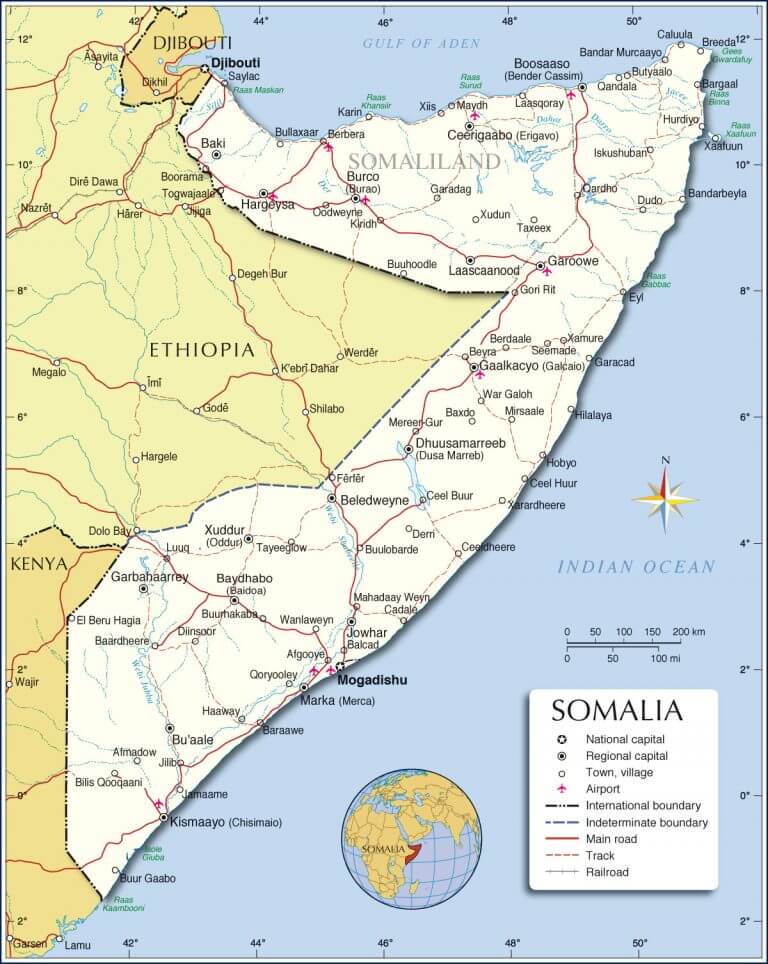
When our flight landed in Mogadishu on February 18th, I descended the steps into staggeringly high heat and humidity to find a USAID officer waiting on the tarmac with a cable: “Martha died in her sleep last night.” Because Dad had written his name as sender and Mom’s name in the message, the poor man hadn’t perfectly realized what news he was carrying.
I introduced G, who was right behind me, talked with the AID man about our luggage, including the excess baggage of course materials, and asked if G could be made comfortable while I tried to call home.
A Vietnam War opponent, I will always bless the Marine Guards at the U.S. Embassy. They had the only phone currently able to make an international connection for a personal call. They couldn’t leave their post, but their empathy and kindness in trying to provide as much privacy as possible marked me for life.
When I finally managed to get through to Dad, we talked about Mom’s passing and how he was doing. “Do you want me to come home?” I asked, knowing it was possible to do so but I’d be leaving everyone in the lurch. “No,” he said. “Russell’s here, and we’ll get through the coming days. Your mother and I raised you to do your duty. That’s the best way to honor her.” So I just got on with it, keeping notes in a journal that’s been packed away for forty years.
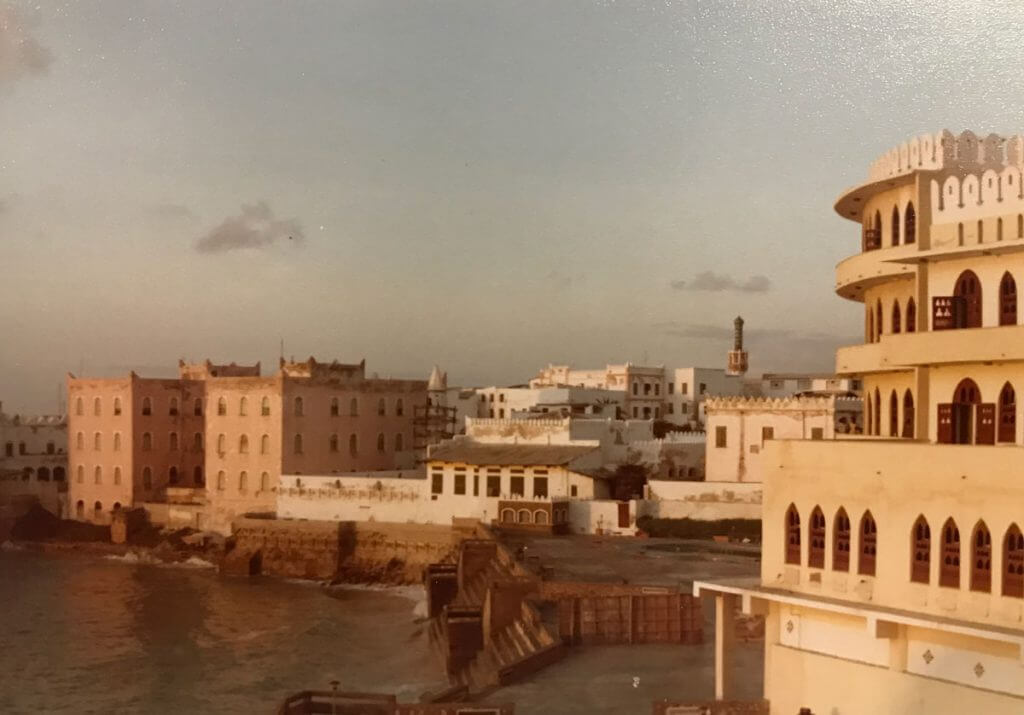
View from my hotel window
Mogadishu
February 19
Met with Dugseyeh, Somali Ag. Ministry official responsible for our project. Trouble with disbursement of our per diem. Trying to get G moved to better room, but no luck. Chinese dinner with USAID evaluation team. Very senior guys, lots of overall USAID/USDA project insights which they kindly shared.
February 20
Hotel hasn’t returned our passports but did move G. Still no per diem. G & I visited ag. high school, research station, Jannaale Extension Center with WP, our USAID Project Manager. Course participants will be grads of the ag high school. WP says course should be a combo of working with villagers and AV practicum. So course needs to be less sophisticated than the one in DC — no electronic or print media, just aids for in-person communication. Some materials we brought are on-target, others inappropriate.
February 21
Met with Dugseyeh to arrange per diem, manual typewriter and with another AID guy to organize video equipment and ag. documentary films. Dugseyeh sent a check for 1/2 per diem to G. Have to cash it Sat. a.m. before leaving for Baidoa [Somali map spelling: Baydhabo] to reconnoiter nearby Bonka Center, where we’ll be training. Wanted to swim after work but hotel pool and ocean too dirty. Dinner at Assan’s on rooftop terrace. Excellent Italian buffet.
Consumer-goods situation far better than Tanzania. Will probably take some food up to Baidoa from here. May stay in govt. guest house there, perhaps with cook.
February 22
Finally got excess baggage with course materials, etc. Xerox boxes that USDA used for packing fell apart. Lots of materials lost, strayed or stolen. Boxes not numbered, so manifest not very helpful. Wish I’d double-checked boxes before leaving DC. Will know better next time.
Baidoa
February 23
Visited Bonka Center. Too far from Baidoa to send participants to purchase their own assignment supplies. Will have to buy and bring from Baidoa ourselves. Also a lot from Mogadishu. Bonka setting leaves much to be desired. Lighting a problem. Wind-borne dust not good for video equipment, so tapes we brought are out of the question. And we won’t be able to tape participant presentations, so they can learn from seeing themselves. No easel, so we’ll have to make one asap. Course will focus on flip charts, posters, demonstrations, exhibits, things extension agents can make themselves and use in remote rural settings without electricity.
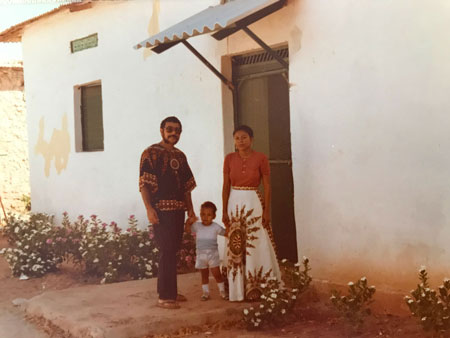
Joe & family with house
Ethiopian MIGs have swooped over town, bombing refugees about 100 kilometers away. No one worried at present.
Being quartered with local USAID family. When I arrived, they hadn’t returned from Mogadishu. No electricity. Fixed oatmeal, raisins and tea for dinner, using supplies brought from Mogadishu. Cold bath. Read by kerosene lamp. Hosts Sandra and Joe arrived c. 9 pm and got 5(!) electricians to turn on lights. Fine sand everywhere. Two American guys at guesthouse have had dysentery, so they fired cook and are eating in restaurants — probably not healthy either. G will stay there, while I’ll bunk here with Sandra and Joe, sleeping on couch.
February 24
Went to market looking for items we’ll need: found burlap, fabric, plastic cord. Also saw nice handicrafts, sandals made from rubber tires and lots of good-looking camels. Went to govt. printing store and found replacements for a lot of stuff lost en route: stencils, paper, markers, glue, paper clips, pens, stapler, rulers, pencil sharpeners. Sandra fixed best meal in Somalia so far. I’ll kick into kitty for food, bring back some stuff from Mogadishu. Bats in roof are startling, but so far, none in room.
Mogadishu
February 25
Return to Mogadishu uneventful but tiring. Important to start early because of heat. Hotel failed to save previously reserved rooms for us, but I talked to head of Reception and worked it out. Pool drained. Waded in ocean.
February 26
AID Project Manager not sympathetic about logistical problems in Baidoa. Learned Afgooye was discussed as course site but rejected. It would have been much better.
Good meeting with Dugseyeh about plans, needs, etc. Council with AID evaluation team helpful re: protecting ourselves about simplifying the course. Probably not much can be done, but we need to get AID agreement in writing.
Problem: G has hearing disability plus trouble understanding Somali English. Doesn’t bode well for interactive training. Need to find activities that he can do and which make him feel effective. One thought: he takes charge of funds for course supplies, per diem, etc.
New typewriter ribbon terrific once I figured out how to insert it — typed up mimeo stencils for course objectives and schedule. Will run them off tomorrow.
February 27
Met with WP and other AID Ag. guy. Took new course objectives and schedule. Got them to agree to put in writing that scope of work has changed to simpler content. They also verbally agreed to site change but said it was Dugseyeh’s decision. D then said no when we got to him. Suspect a phone call was made while we were en route. Various logistics problems with Ministry agricultural photos, films, etc. Won’t take video equipment to Baidoa because of blowing sand. A day of winning and losing. We’ll go to Baidoa and do our best to teach a course for which we’re ill-prepared in a poor facility. Drafted letter to be hand-carried by departing consultant for USDA/Washington, apprising our managers there of circumstances. At least everyone is informed of the situation as we see it. Next time, maybe we’ll all be better decision-makers.
February 28
Expected: car to arrive at 8 am, G to cash check for course supplies at bank, G & I to get course and personal supplies for Baidoa. Happened: car didn’t come til after 10, check lacked necessary signature, no supplies purchased. On the other hand: made hotel reservations for our return, retrieved our passports and mimeos of course objectives/schedule. Despite much talk, still no list of participants.
February 29
We met with members of AID Evaluation team — anthropologist, ag economist and political scientist. Their insights into the Bay Region [pronouced “bahy”] and the Extension Service very helpful for refining course design.
Mogadishu – Baidoa
March 1
Car arrived pretty much on-time. G went to bank alone and cashed check for course supplies. I took video equipment and one of my suitcases to AID for storage. Returned to hotel and waited quite some time in lobby for planned meeting with G. He finally came down, and we went shopping for Baidoa: 4 cases of soda from Marines, fruits from market, bread and cookies from bakery, canned goods from 2 shops. Stopped by Dukseyeh on way out of town to drop off copies of more sophisticated materials we’d brought for future use when more appropriate.
Trip to Baidoa relatively uneventful except for no Fanta at Buurhakaba, only ambient-temp Coke, which Somali driver and I drank but not G. He called it a “bitter, bitter disappointment.” He’d refused to drink anything at lunch in Mogadishu, despite my having previously emphasized the importance of staying hydrated in this climate, drinking anything available and safe. Warm Coke pretty awful, but wet.
Arrived Baidoa 5 pm, off-loaded G and his stuff at guest house, went on to Bonka but no keys. Back to Baidoa to find Abdulkadir, local Project Manager. Cokes, talk, drivers go off to fetch keys. Learn there’s one female participant with B.S. degree coming to course — really inappropriate (different job, different level, accommodation difficult). G and other AID consultants each currently in his own house. Idea: move G in with ag engineer, move participant and me into guesthouse. Tell Abdulkadir I’ll try to make this happen. Return to Bonka, unload materials. Back to guesthouse. G adamantly refuses to move in with anyone, wants to live alone. I suggest we not come to any decision tonight and talk in morning.
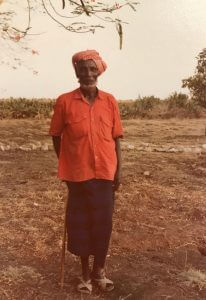
Guesthouse Guard
Joe Lopez waiting outside, so we load my stuff in his Land Rover. Talk with guesthouse guard whose hennaed beard signifies his pilgrimage to Mecca(!). Arrive Lopez’s. Drink lots of lemonade and water. Eat. Feel better. Talk with Joe about accommodation problems. He suggests taking money from project funds to put up female participant with a family or at hotel. That’ll work, so I’ll return to bunking on Sandra and Joe’s couch for the duration.
Good discussion with Joe about his doing a course session, taking participants on Saturday field trips, how I can get sourgum, groundnuts, sunflower seeds, etc. to demonstrate exhibit techniques.
I’m glad to be back and enjoyed trip up from Mogadishu. Feel good about course contributions from Lopez and other ag specialists, touched by warm welcome at Bonka. There’s good work to do here, if we can just get down to it.
March 2
First day of course. Dugseyeh came from Mogadishu to make opening speech. English facility among participants a real problem, even tho we were told that ag high school is English-medium. Some participants speak great, others almost without ability to understand or speak, English. Talked with G about our need to speak slowly and write all key points on flipcharts/blackboards (seems all Ps can read English better than some can hear/speak it). Looks like little problem for Ps to work on their own individual projects or in small groups using Somali. The slogans on their posters are quite good. We can make this work.
Because of G’s own difficulties with hearing, I put him in charge of our food, so he’d have a sense of contribution. Bonka serves meals to participants. We tried lunch when we were here before, but we heard it’s not safe for Westerners who lack local flora and fauna. In addition, if I’m honest, I found it really hard to get down Somali version of spaghetti cooked over wood fire, everything tasting of smoke. G brought food for our lunch today, but it had to be cooked, so we didn’t get anything to eat. Now he knows the situation and has hopefully learned what to do for our remaining time here.
March 3
As I began to introduce the first session, there was a loud bang directly under my chair. At first I thought it was a bomb, wondering who and why. G also later said his first thought was of a bomb. [Ethiopian MIGs affecting our judgement???] I looked under my chair and saw fragments of a light bulb. Looking up, I saw a 3-foot fluorescent holder empty. Looking back, I saw shattered glass directly behind me. If I’d been sitting a few inches farther from the table, I’d be writing this from a Nairobi hospital, my head full of stitches.
March 4
Liquid intake a problem, beginning cystitis symptoms. Will boil water every night, put it in wine bottle with some lime juice and take it to Bonka. Bought bread in Baidoa on way to Bonka. Much better quality than Tanzania. Must do this everyday.
G took morning session to talk about U.S. Extension in his state and how his Ag. Comm. Dept. functioned. He assumed too much knowledge on the part of listeners — “4-H”, “Congress”, acronyms, etc. — but Ps seemed interested, with questions afterwards. Later, one P said to me that G’s English was hard to understand, by which I think he meant accent, slang and idioms (“Let me visit with you for a spell…”). I tried during our break to talk tactfully with G about modifying our speech to fit Ps’ abilities.
I led discussion with Ps on why farmers don’t take advice and what the extension agent’s response to each block should be. They were good at naming the difficulties and worked well together to come up with strategies.
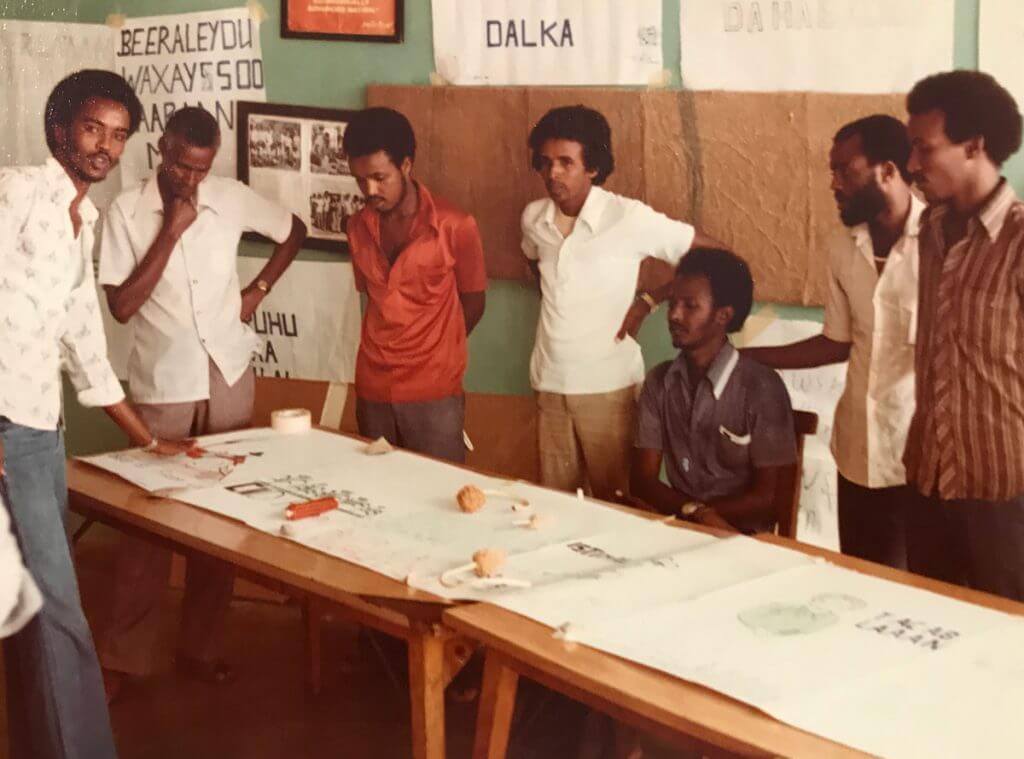
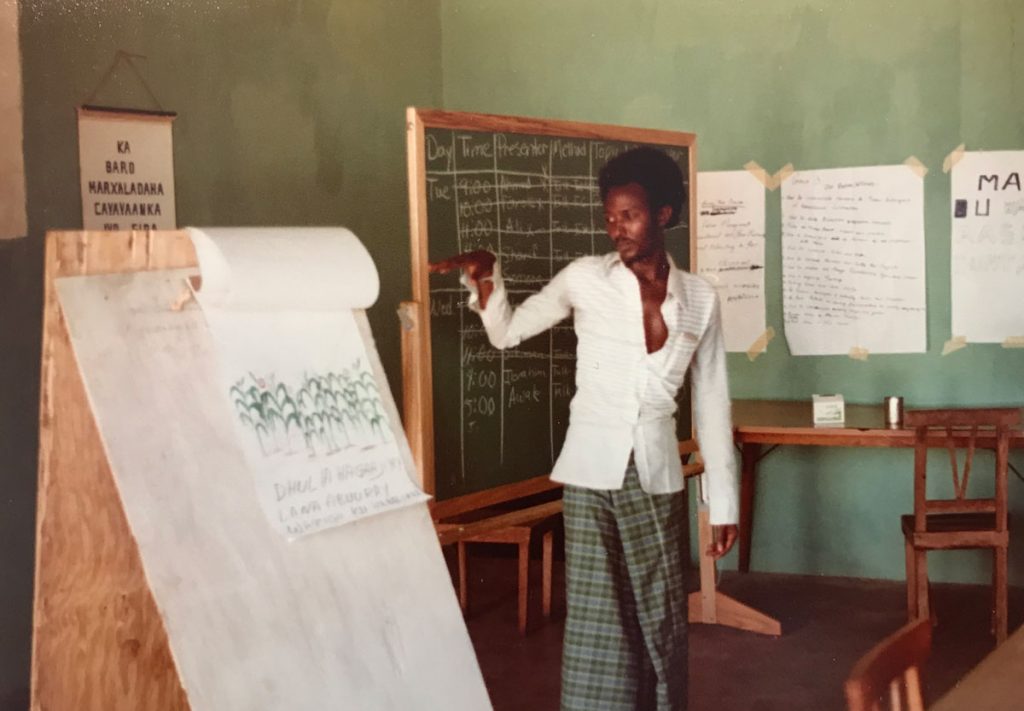
So the training continued. I was able to get two cots, a table, chair and cookstove into the room that G and I shared for breaks, including the long one after lunch for a siesta in the heat of the day before returning for a late afternoon session. The participants enthusiastically entered into learning to create the various kinds of simple media. When each type of medium was complete, they made their individual or group presentations with the rest of us playing the role of farmers. The participants’ skills in preparation and presentation became increasingly sophisticated; e.g. contours on a sand table to show the effects of plowing up and down a slope instead of around a hillside. We often showed relevant films in the evenings when the electricity cooperated, and those were especially well-received. One big problem? The participants had never before been asked to evaluate anything, so weekly course evaluations were challenging. They couldn’t imagine that they’d be asked to evaluate us and what we were doing. Wasn’t that what we should do about their performance? And what were those scales, 1-5??? But the concept and practice soon became natural. Meanwhile….
***
G failed to bring any fruit again. I increasingly feel like I can’t depend on him for anything. He’s got all the lunch food at his house, but almost every day he forgets something — enough drinks, fruit, etc. I talked with him about the importance of good nutrition to maintain our health here, but his view seems to be that we’re in Baidoa only 4 weeks, so it doesn’t matter what we eat.
The pump is out at Bonka, so no water to wash, etc. They brought in a tank-full. Gas leaking from our cookstove. Concerned about safety.
Ibrahim [Bonka caretaker] brought me 3 small eggs from the Bonka chickens. I was very touched and grateful. Unsure whether recompense would be insulting. Decided to err on side of gracious Somali culture.
G continuing to be less effective in course and with funds than he and I both need him to be. Have decided to confer with two senior members of AID evaluation team. I’m OK managing the course, logistics, etc., but not G.
Bats came out and flew all over the classroom at sundown, like they do everyday. Fascinating — the room is full of people, chairs, hanging lights and flying bats which never hit a thing.
Sandra and Joe returned late from meeting in Mogadishu. Turns out meeting was for security briefing about Ethiopian MIGs, etc.
For two weeks, we’ve been emphasizing the importance of audience involvement and not lecturing. During the first presentation, most of us were role-playing farmers. When the presenter started to lecture, I, dressed as a farmer, complained loudly that these young guys always talk and never listen. Then I walked off in a huff. It was good for a laugh, and it seemed to get the point across. The presenter started over with questions to the “farmers” about their problems, and the next presentation followed suit.
They got the Bonka pump working. Nice to have water, especially for hand-washing, etc. The few citrus trees were so dry.
Ibrahim brought eggs again. I gave them to G in an effort to get some protein into his evening meal. G says he’s eaten bread with ketchup and mustard more than once.
Met with two AID Evaluation team members, seeking their advice about managing someone like G. Good conversation, very supportive and helpful.
***
The advice of the ag economist stayed with me for the rest of my life: “I ask myself how I can make it easy for the other person to do what I need.” I haven’t always been as good as I’d like, putting that advice into practice. But I sure have asked myself that question more than once.
Let’s pause here and return for the end of the Somali story in the next post. Still lots to tell — danger from the skies, stolen cash, drama in the classroom and camels for sale.
* * *
LET ME HEAR FROM YOU: nancy@nancyswing.com
* * *
If you enjoyed reading this post, I hope you’ll SUBSCRIBE by clicking on the button below. Every month, when I post a new excerpt from my life overseas, you’ll get an email with a link so you can read the next installment. Subscription is free, and I won’t share your contact information with anyone else. Your subscribing lets me know you’re reading what I write, and that means a lot.
